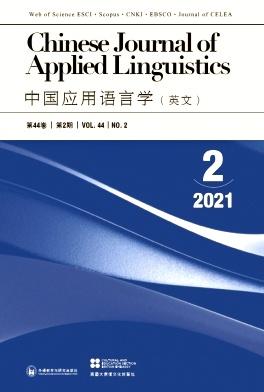“说”的话语标记:比较研究
IF 1.1
4区 教育学
Q3 EDUCATION & EDUCATIONAL RESEARCH
引用次数: 0
摘要
在言语行为理论的理论框架内,根据人称代词对dm进行分组。“说”的情态从句(如“I should say”)作为插入语,失去了其作为矩阵从句的地位,降低了肯定语气。本文章由计算机程序翻译,如有差异,请以英文原文为准。
Discourse Markers of “Saying”: A Comparative Study
Abstract The present study compares the discourse markers (DMs) of “saying” in Mandarin Chinese ke yi shuo (lit. “can say”) and ying gai shuo (lit. “should say”) with their equivalents in English, by drawing the parallel corpora from The Selected Works of Deng Xiaoping (Volume III) (henceforth The Works), so as to uncover the pragmatic motivation for the variation in translating the DMs of “saying.” The analysis is conducted within a theoretical framework of speech act theory, by grouping the DMs according to their personal pronouns. Moreover, by comparing the uses of personal pronouns in English and Chinese, the current study confirms that The Works keeps the consistency between the two languages as well as with the characteristics and styles of Deng Xiaoping’s locution. It also finds that modalized DMs of “saying” (e. g., “I should say”), as a parenthesis, lose their status as matrix clauses and help reduce the tone of affirmation.
求助全文
通过发布文献求助,成功后即可免费获取论文全文。
去求助
来源期刊

Chinese Journal of Applied Linguistics
EDUCATION & EDUCATIONAL RESEARCH-
CiteScore
1.50
自引率
0.00%
发文量
377
期刊介绍:
The Chinese Journal of Applied Linguistics (CJAL) (formerly known as Teaching English in China – CELEA Journal) was created in 1978 as a newsletter by the British Council, Beijing. It is the affiliated journal of the China English Language Education Association (founded in 1981 and now the Chinese affiliate of AILA [International Association of Applied Linguistics]). The Chinese Journal of Applied Linguistics is the only English language teaching (ELT) journal in China that is published in English, serving as a window to Chinese reform on ELT for professionals in China and around the world. The journal is internationally focused, fully refereed, and its articles address a wide variety of topics in Chinese applied linguistics which include – but also reach beyond – the topics of language education and second language acquisition.
 求助内容:
求助内容: 应助结果提醒方式:
应助结果提醒方式:


